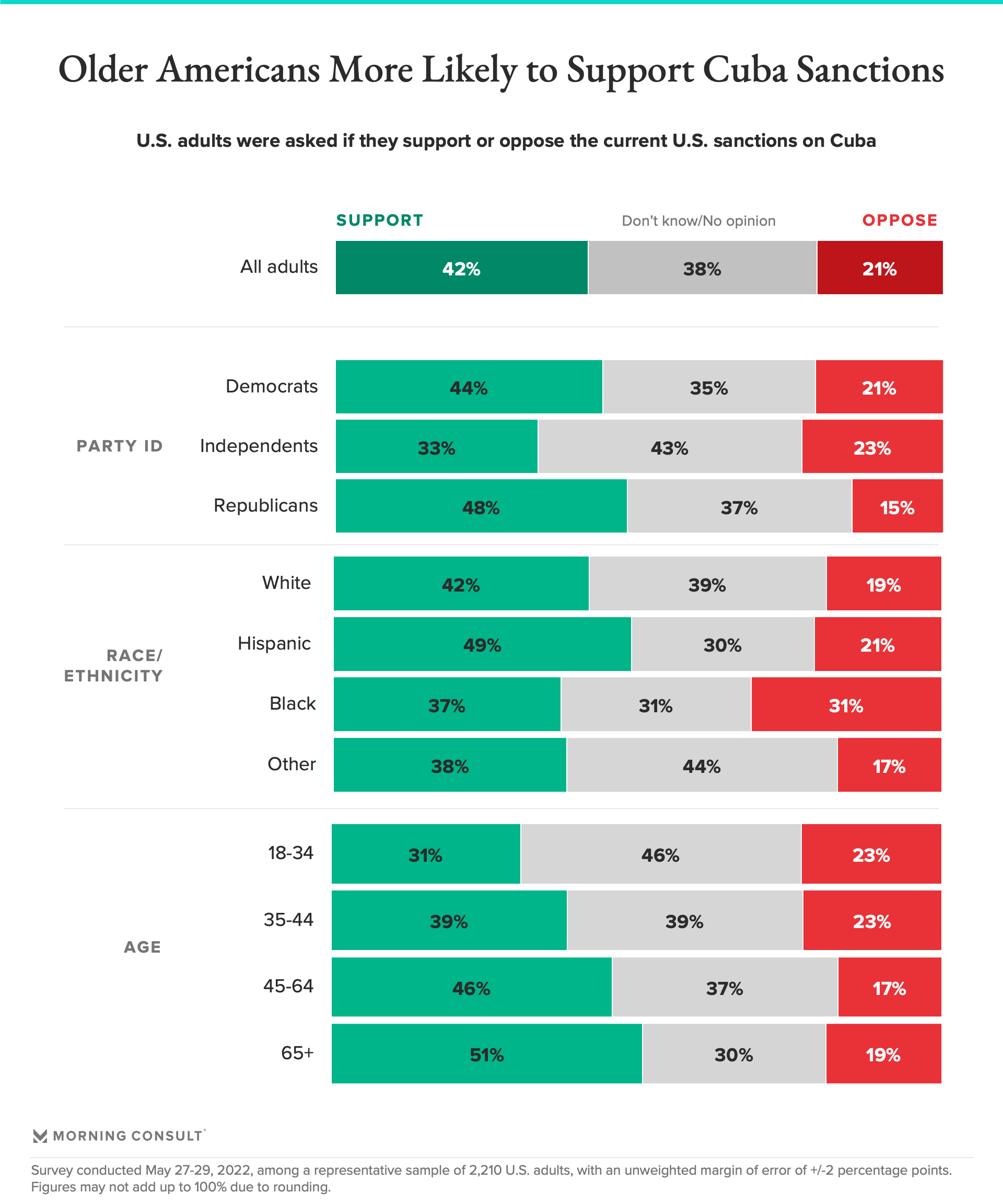Americans Mostly Support the Status Quo in the U.S.-Cuba Relationship
The Biden administration has largely turned a cold shoulder to re-engaging with Cuba after former President Donald Trump’s reversal of Obama-era rapprochement. A new Morning Consult survey suggests that stance is in line with public opinion: Reconciliation is not a priority for most Americans.

American sentiment on U.S.-Cuba policy
- More than twice as many Americans support as oppose existing sanctions on Cuba, 42% to 21%, though many (38%) either did not know or had no opinion. When offered information regarding Cuba’s mass arrest and trials of protesters in July 2021, support climbs to 56%. A similar share ( 55%) said they would support further sanctions if Havana continues to abuse human rights.
- Americans who are 65 or older — old enough to remember the Cuban Revolution and ensuing tensions with the United States — are most likely to support sanctions, at 51% unprompted and 66% when informed of recent abuses. Each succeeding age cohort is less likely to support sanctions.
- Hispanic adults are more likely than whites to support sanctions unprompted (49% to 42%), but support for sanctions among whites rises to match support among Hispanics when informed of the mass arrests. Younger and Black Americans are the most likely to oppose sanctions, though support outweighs opposition among both groups.
The recent history of U.S.-Cuba relations
One of President Joe Biden’s major foreign policy achievements during his time as vice president was the so-called Cuban thaw, which warmed up one of the Cold War’s last icy spots in the Western Hemisphere. But the Trump administration slammed the freezer door shut by ending bilateral travel, reimposing sanctions and designating Havana as a state sponsor of terrorism.
After taking the Oval Office, though, Biden dedicated little time to Cuba, and survey data suggests that may be a domestically savvy move. Even though opposition to current sanctions is highest among two key demographics for the Democrats, it’s by no means the consensus position. The Democratic Party is also confronting diminishing returns in recent election cycles with Hispanic Americans, among whom support for sanctions is strong.
That being said, Latinidad is complex, and the political interests of Cuban-Americans often differ from communities with roots in other parts of Latin America. That means hawkish Cuba policies that turn out the vote in Miami might not move the needle in Phoenix, Denver or Houston.
But U.S.-Cuba tension is already hurting the Biden administration geopolitically, after Mexican President Andres Manuel López Obrador reacted to the exclusion of Cuba, Venezuela and Nicaragua from this week’s Summit of the Americas in Los Angeles by declining to attend himself. That prompted the leaders of Bolivia and Honduras to announce they would also boycott, and led to criticism from the leaders of Chile, Argentina and multiple Caribbean countries.
“The reluctance of the U.S. to engage with Cuba further contributes to perceptions that the U.S. proclaimed solidarity with the region does not translate into concrete new policies,” said Lorena Barberia, associate professor of political science at the University of São Paolo.
Americans Mostly Back Existing U.S. Stances on Cuba
Americans are most likely to oppose remittances for Cubans
- Many Cubans rely on remittances from relatives in the United States for economic support, and the Biden administration increased the cap to $1,000 every three months following López Obrador’s boycott. But only 31% of Americans support removing restrictions entirely, while 32% oppose and 37% aren’t sure.
- Americans are more inclined toward people-to-people measures, such as family reunification visits (at 51% support), and the Biden administration said it plans to resume those. Support for resumption of bilateral travel and for restaffing the U.S. embassy in Havana was slightly softer, at 45% and 47% support, respectively.
Survey conducted May 27-29, 2022, among a representative sample of 2,210 U.S. adults, with an unweighted margin of error of +/-2 percentage points. Figures may not add up to 100% due to rounding.
Matthew Kendrick previously worked at Morning Consult as a data reporter covering geopolitics and foreign affairs.